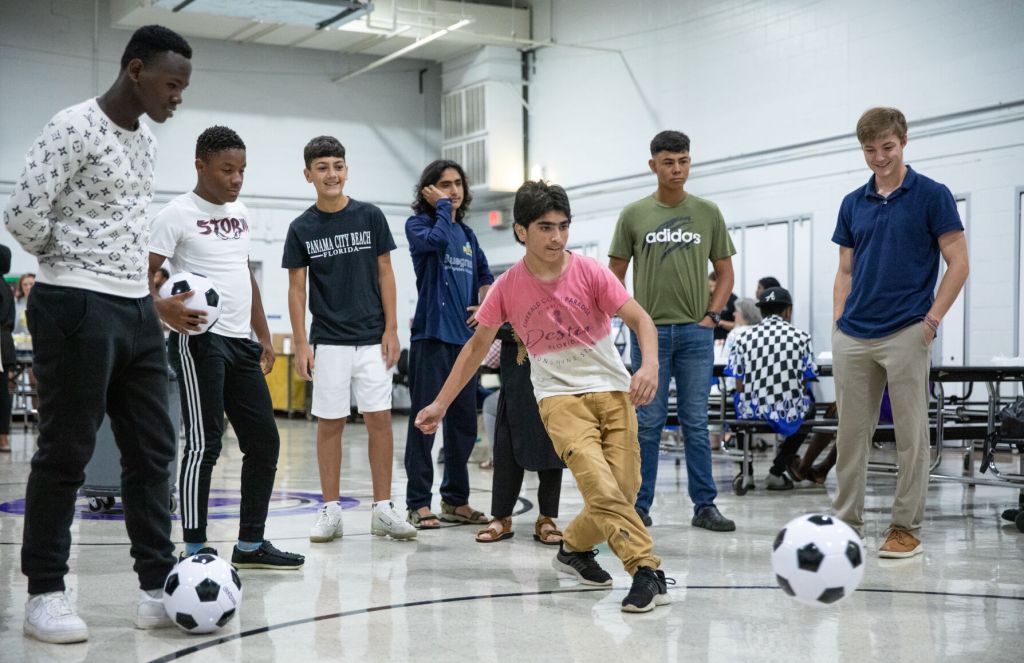City schools seek partners for new English-learning co-op
Published 8:00 am Thursday, January 18, 2024

- A group of boys takes turns kicking a soccer ball into a net at the Teranga Academy Block Party for the upcoming school year at the Bowling Green Learning Center on Aug. 3.
Young refugees and migrants entering Bowling Green’s educational system will soon have a new chance to start a career stateside.
Bowling Green Independent School District approved a partnership with nonprofit organization Fugee Family last week to facilitate a co-op for 16- to 18-year-old foreign-born students.
“It’s a way for newcomers to get more support as they navigate employment and participate in work credit,” Fugee Founder Luma Mufleh said. “All the students at Teranga (Academy) that want to participate in the work program will become members of the co-op, which means they own a part of the co-op.”
The co-op will place 10 students in its first cohort, with each student choosing their place of work. Students will be able to work some hours during school days and during the weekend, depending on their schedule.
Trace Die Cast and Embassy Suites have agreed to accept student workers, and Superintendent Gary Fields said students can find work in the district’s kitchens as well.
Students will begin their jobs alongside a mentor while they get settled, Fields said. Through observation and communication with employers and students, the district will be able to tailor its instruction to better meet the needs of participants.
“That’s the beauty of the flexibility we have with Teranga Academy and the great support from the Department of Education has allowed us to do that,” Fields said. “In the (educational) system we have, it doesn’t fit, but with some flexibility from the Department of Education we’ve been able to work that out.”
Mufleh said they expect many more participants as the program progresses and more job opportunities as community partners sign on.
Fields added that the program helps to address the two major goals he has heard from foreign-born students over his nine years as superintendent.
“Kids come and they tell our staff all the time, ‘I want to learn English, and I want to get a job,’ “ Fields said. “That’s two checkboxes. We hope for more, but those were the two main things that they wanted.”
Fields said the community as a whole benefits from the arrangement as employers struggle to find qualified, willing employees.
“We are desperate in this community for quality people who want to work in the great opportunities we have locally,” Fields said. “When we look at our enrollment, we’re at 1,024 (English-language learning) students. (…) That’s future employees in our community, so we better figure out a way to give them opportunities to be ready to work.”
Mufleh added the opportunity provides more than just a paycheck.
“They get some training, they get to learn how to open a bank account, how to build a resume, all that stuff,” Mufleh said. “Things that some kids get typically from their parents, but the parents of our students don’t always know how to navigate some of these systems.”
Even further, Mufleh said programs like this help students persevere through a difficult educational experience. Students gain tangible experience outside of the classroom while also working toward graduation credits.
Mufleh said that’s especially important as the drop-out rate of high school students is highest among multilingual students, many of whom are unfamiliar with formal American education.
“This is an opportunity to meet the kids where they are,” Mufleh said. “They have pressure and responsibilities to help provide for their families, so this way they earn money, but they will still earn a high school diploma.”
Fields said any businesses looking to place a student can contact the district’s central office at (270) 746-2200 for additional information. Tours can be arranged for employers to meet potential participants at Teranga Academy.
“We’re always looking for other partners in really any area,” Fields said. “We want to get kids in areas that they have an interest in. It’s not about just getting the job, it’s about getting a job that they have some interest in.
“We should all be able to work towards a passion or something we’re interested in, so whatever the business is, we’d be willing to sit down and talk about giving our kids an opportunity.”






